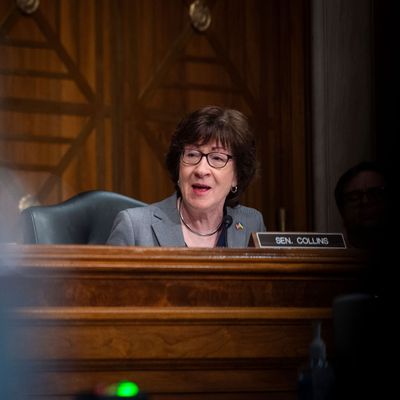
There is rightly a lot of attention focused on the hazy behind-the-scenes deliberations of a bipartisan Senate “gang” working on some sort of measure, however slight, to address the latest epidemic of gun violence. But there’s also a bipartisan Senate gang that has been meeting quietly to deal with another urgent problem: the possibility of an attempted presidential-election coup like the one Donald Trump and his cronies tried to pull off in 2020. It’s a sensitive issue, obviously, since Trump’s status as the unofficial head of the GOP remains reasonably solid, and heading off another effort to overturn an adverse presidential result may imply that Trump’s election-“theft” fables were a pack of lies. So the gang is moving carefully. And that’s why this modest report via NBC News from the Republican most involved in these deliberations, Susan Collins, is potentially important:
Two sources familiar with the group’s work said it is close to a deal, having settled on a series of new provisions and working through options on one major unresolved issue.
“We’ve made a lot of major decisions,” Sen. Susan Collins, R-Maine, a leader of the group, said in an interview before the meeting. “We’ve resolved a lot of issues, but we have some more work to do, which I hope we’ll finish up this week.”
The areas that have apparently been resolved within the bipartisan group include a cleanup of the provisions in the hoary — and, until recently, obscure — Electoral Count Act of 1887 governing the formal certification of presidential elections in Congress, the routine event that suddenly turned toxic on January 6, 2021. The fix would make it clear that the vice-president’s role in the count of electoral votes is purely administrative (contra Trump’s argument that Mike Pence could have awarded the election to Team Trump or “sent the election back to the states” to decertify Biden electors and replace them with Trump electors). And it would also make it harder than it currently is for Congress to reject state-certified electors; right now, a majority in both houses can do so without a shred of justification (and, in theory, might have done so in 2021 had Republicans controlled the House and Senate).
According to NBC, there is just one big issue that’s outstanding, and it’s at the front end of the process for confirming election results long after voting has ended:
The main issue the Senate group hasn’t resolved … is how to address the “safe harbor” deadline — the date by which states must certify their presidential election results to ensure they are counted without interference from Congress. But what if a state misses the deadline? What if it sends an “alternate slate” of electors for a losing candidate?
In late 2020, Team Trump tried (incompetently) to create confusion about electors via self-designated “fake elector” slates and efforts to get state legislators to disregard the allegedly “rigged” popular-vote totals and authorize competing electors. Had this devious plot gotten close to fruition, federal courts might well have intervened to stop it. But it would be helpful to explicitly authorize a judicial resolution process so that by the time Congress met to ratify the election, there would be no doubt about the identity of legitimate electors. Rogue legislators, governors, presidential candidates, or mobs rallying on the Mall would know from the get-go that a judge would stand in the way of any trickery.
You can imagine that a clear role for federal judges in this process may cause some conservative knees to jerk on the grounds that it would involve federal authority over election processes assigned to the states in the Constitution. But obviously there is nothing more federally intrusive than Congress rejecting popularly chosen and state-certified electors. Anything necessary to ensure that doesn’t happen should be in order.
With or without this clarification, though, a basic fix of the Electoral Count Act shouldn’t be especially controversial to responsible Republicans, particularly since in the next presidential election, the shoe will be on the other foot, with Kamala Harris presiding over the joint session of Congress that counts electors. But Republican senators will have to be willing to weather complaints from the 2021 scofflaw about any effort to close off his options for next time around. Trump’s position on the Electoral Count Act has been incoherent. In the heat of the attempted election coup, his lawyer John Eastman argued the ECA was unconstitutional, leaving Pence an untrammeled right to choose or reject electors. But when Congress first began looking at an ECA fix, the ex-president objected on the weird grounds that, by addressing the issue of the veep’s powers, his enemies were conceding that Pence could have kept himself and the Boss in power if only he’d had the courage:
In any event, the country needs at least ten Republican senators to run the risk of criticism from Trump in order to ensure the next presidential election doesn’t descend into chaos. It needs to happen now, when there’s momentum under way, and before the 2024 cycle begins. And Democrats need to make it easy for Republicans to explain this step as having nothing to do with either party’s agenda for gaining power. That’s what bipartisan gangs are for.
More on Politics
- Trump Is Threatening to Invade Panama, Take Back Canal
- What Happened to Texas Congresswoman Kay Granger?
- Who Is Lara Trump and What’s With the Quashed Senate Rumors?






























